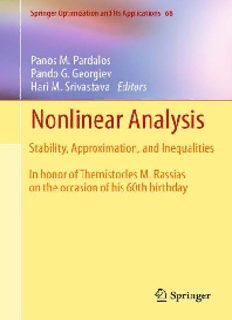Table Of ContentSpringer Optimization and Its Applications
Springer Optimization and Its Applications
VOLUME68
ManagingEditor
PanosM.Pardalos(UniversityofFlorida,Gainesville,USA)
Editor-CombinatorialOptimization
Ding-ZhuDu(UniversityofTexasatDallas,Richardson,USA)
AdvisoryBoard
J.Birge(UniversityofChicago,Chicago,IL,USA)
C.A.Floudas(PrincetonUniversity,Princeton,NJ,USA)
F.Giannessi(UniversityofPisa,Pisa,Italy)
H.D.Sherali(VirginiaTech,Blacksburg,VA,USA)
T.Terlaky(LehighUniversity,Bethlehem,PA,USA)
Y.Ye(StanfordUniversity,Stanford,CA,USA)
AimsandScope
Optimizationhasbeenexpandinginalldirectionsatanastonishingratedur-
ing the last few decades. New algorithmic and theoretical techniques have
beendeveloped,thediffusionintootherdisciplineshasproceededatarapid
pace,andourknowledgeofallaspectsofthefieldhasgrownevenmorepro-
found. At the same time, one of the most striking trends in optimization
is the constantly increasing emphasis on the interdisciplinary nature of the
field.Optimizationhasbeenabasictoolinallareasofappliedmathematics,
engineering,medicine,economics,andothersciences.
The series Springer Optimization and Its Applications publishes under-
graduate and graduate textbooks, monographs and state-of-the-art exposi-
tory work that focus on algorithms for solving optimization problems and
also study applications involving such problems. Some of the topics cov-
ered include nonlinear optimization (convex and nonconvex), network flow
problems, stochastic optimization, optimal control, discrete optimization,
multi-objectiveprogramming,descriptionofsoftwarepackages,approxima-
tiontechniquesandheuristicapproaches.
Forfurthervolumes:
www.springer.com/series/7393
Panos M. Pardalos (cid:2) Pando G. Georgiev (cid:2)
Hari M. Srivastava
Editors
Nonlinear Analysis
Stability, Approximation, and Inequalities
In honor of Themistocles M. Rassias on the occasion
of his 60th birthday
Editors
PanosM.Pardalos PandoG.Georgiev
CenterforAppliedOptimization CenterforAppliedOptimization
ISEDepartment UniversityofFlorida
UniversityofFlorida Gainesville,FL
Gainesville,FL USA
USA
HariM.Srivastava
and
DepartmentofMathematics&Statistics
LaboratoryofAlgorithmsandTechnologies UniversityofVictoria
forNetworksAnalysis(LATNA) Victoria,BritishColumbia
NationalResearchUniversity Canada
HigherSchoolofEconomics
Moscow
Russia
ISSN1931-6828 SpringerOptimizationandItsApplications
ISBN978-1-4614-3497-9 ISBN978-1-4614-3498-6(eBook)
DOI10.1007/978-1-4614-3498-6
SpringerNewYorkHeidelbergDordrechtLondon
LibraryofCongressControlNumber:2012940728
©SpringerScience+BusinessMedia,LLC2012
Thisworkissubjecttocopyright.AllrightsarereservedbythePublisher,whetherthewholeorpartof
thematerialisconcerned,specificallytherightsoftranslation,reprinting,reuseofillustrations,recitation,
broadcasting,reproductiononmicrofilmsorinanyotherphysicalway,andtransmissionorinformation
storageandretrieval,electronicadaptation,computersoftware,orbysimilarordissimilarmethodology
nowknownorhereafterdeveloped.Exemptedfromthislegalreservationarebriefexcerptsinconnection
with reviews or scholarly analysis or material supplied specifically for the purpose of being entered
and executed on a computer system, for exclusive use by the purchaser of the work. Duplication of
this publication or parts thereof is permitted only under the provisions of the Copyright Law of the
Publisher’slocation,initscurrentversion,andpermissionforusemustalwaysbeobtainedfromSpringer.
PermissionsforusemaybeobtainedthroughRightsLinkattheCopyrightClearanceCenter.Violations
areliabletoprosecutionundertherespectiveCopyrightLaw.
Theuseofgeneraldescriptivenames,registerednames,trademarks,servicemarks,etc.inthispublication
doesnotimply,evenintheabsenceofaspecificstatement,thatsuchnamesareexemptfromtherelevant
protectivelawsandregulationsandthereforefreeforgeneraluse.
Whiletheadviceandinformationinthisbookarebelievedtobetrueandaccurateatthedateofpub-
lication,neithertheauthorsnortheeditorsnorthepublishercanacceptanylegalresponsibilityforany
errorsoromissionsthatmaybemade.Thepublishermakesnowarranty,expressorimplied,withrespect
tothematerialcontainedherein.
Printedonacid-freepaper
SpringerispartofSpringerScience+BusinessMedia(www.springer.com)
With ourdeepestappreciation,
wededicatethisvolume
totheeminentmathematician
ThemistoclesM.Rassias
on theoccasion ofhis60thbirthday
ThemistoclesM.Rassias
Preface
This volume is dedicated to Themistocles M. Rassias, on the occasion of his 60th
birthday.Thearticlespublishedherepresentsomerecentdevelopmentsandsurveys
inNonlinearAnalysisrelatedtothemathematicaltheoriesofstability,approxima-
tion,andinequalities.
ThemistoclesM. Rassias was borninPellananearSpartainGreecein theyear
1951.HeiscurrentlyaProfessorintheDepartmentofMathematicsattheNational
Technical University of Athens. He received his Ph.D. in Mathematics in the year
1976fromtheUniversityofCaliforniaatBerkeleywithStephenSmaleashisthesis
advisor.
Rassias’workextendsoverseveralfieldsofMathematicalAnalysis.Itincludes
Global Analysis, Calculus of Variations, Nonlinear Functional Analysis, Approxi-
mationTheory,FunctionalEquations,andMathematicalInequalitiesandtheirAp-
plications. Rassias’ work has been embraced by several mathematicians interna-
tionallyandsomeofhisresearchhasbeenestablishedwiththescientificterminol-
ogy “Hyers–Ulam–Rassias stability”, “Cauchy–Rassias stability”, “Aleksandrov–
Rassiasproblemforisometricmappings”.
Thestabilitytheoryoffunctionalequationshasitsrootsprimarilyintheinvesti-
gationsbyS.M.Ulam,whoposedthefundamentalproblemforapproximatehomo-
morphismsintheyear1940,thestabilitytheoremfortheadditivemappingdueto
D.H.Hyers(1941),andthestabilitytheoremforthelinearmappingofTh.M.Ras-
sias (1978). Much of the modern stability of functional equations has been influ-
encedbytheseminalpaperofTh.M.Rassias,entitled“Onthestabilityofthelinear
mappinginBanachspaces”[ProceedingsoftheAmericanMathematicalSociety72,
297–300(1978)],whichhasprovidedatheoreticalbreakthrough.Foranextensive
discussionofvariousadvancesinstabilitytheoryoffunctionalequations,thereader
isreferredtotherecentlypublishedbookofS.-M.Jung,“Hyers–Ulam–RassiasSta-
bilityofFunctionalEquationsinNonlinearAnalysis”,©Springer,NewYork,2011.
In the formulation as well as in the solution of stability problems of functional
equations, one frequently encounters the interplay of Mathematical Analysis, Ge-
ometry,Algebra,andTopology.Rassiashascontributedalsotoothersubjectssuch
as Minimal Surfaces (Plateau problem), Isometric Mappings (Aleksandrov prob-
ix
x Preface
lem),ComplexAnalysis(PoincaréinequalityandMöbiustransformations),andAp-
proximationtheory(Extremalproblems).Hehaspublishedmorethan230scientific
researchpapers,6researchbooksandmonographs,and30editedvolumesoncur-
rent research topics in Mathematics. He has also published 4 textbooks in Mathe-
maticsforGreekuniversitystudents.
Some of the honors and positions that he has received include “Membership”
at the School of Mathematics of the Institute for Advanced Study at Princeton for
the academic years 1977–1978 and 1978–1979 (which he did not accept for fam-
ily reasons); “Research Associate” at the Department of Mathematics of Harvard
University (1980) invited by Raoul Bott, “Visiting Research Professor” at the De-
partment of Mathematics of the Massachusetts Institute of Technology (1980) in-
vited by F.P. Peterson; “Accademico Ordinario” of the Accedemia Tiberina Roma
(since1987);“Fellow”oftheRoyalAstronomicalSocietyofLondon(since1991);
“Teacheroftheyear”(1985–1986and1986–1987)and“OutstandingFacultyMem-
ber”(1989–1990,1990–1991,and1991–1992)oftheUniversityofLaVerne,Cal-
ifornia (Athens Campus); “Ulam Prize in Mathematics” (2010). In addition to the
above, during the last few years, Th.M. Rassias had been bestowed with honorary
degrees “Doctor Honoris Causa” from the University of Alba Iulia in Romania
(2008)andan“HonoraryDoctorate”fromtheUniversityofNišinSerbia(2010).In
2003,avolumeentitled“StabilityofFunctionalEquationsofUlam–Hyers–Rassias
Type” was dedicated to the 25 years since the publication of Th. M. Rassias’ sta-
bilitytheorem(editedbyS.Czerwik,Florida,USA).In2009,aspecialissueofthe
Journal of Nonlinear Functional Analysis and Applications (Vol. 14, No. 5) was
dedicated to the 30th Anniversary of Th.M. Rassias’ stability theorem. In 2007, a
special volume of the Banach Journal of Mathematical Analysis (Vol. 1, Issues 1
& 2) was dedicated to the 30th Anniversary of Th.M. Rassias’ stability theorem.
He is an “editor” or “advisory editor” of several international mathematical jour-
nals published in the USA, Europe, and Asia. He has delivered lectures at several
universitiesinNorthAmericaandEurope,includingHarvardUniversity,MIT,Yale
University,PrincetonUniversity,StanfordUniversity,UniversityofMichigan,Uni-
versityofMontréal,ImperialCollegeLondon,Technion—IsraelInstituteofTech-
nology(Haifa),TechnischeUniversitätBerlin,andtheUniversitätGöttingen.
Thecontributedpapersinthepresentvolumehighlightsomeofthemostrecent
achievementsthathavebeenmadeinMathematicalAnalysis.
Rassias’curiosity,enthusiasmaswellashispassionfordoingresearchaswellas
teachingareunlimited.HehasservedasamentorinMathematicstoseveralstudents
atuniversitieswherehehastaught.
His research work has received up-to-date more than 7,000 citations (see, e.g.,
theGoogleScholar).Thatisanimpressivenumberofcitationsforamathematician.
Thus,Rassiashasachievedinternationaldistinctioninthebroadestsense.
ThereaderisreferredtothearticleofPerEnfloandM.SalMoslehian,Aninter-
view with Themistocles M. Rassias, Banach Journal of Mathematical Analysis 1,
252–260(2007)[seealsowww.math.ntua.gr/~trassias/].
Inwhatfollows,wepresentabriefoutlineofthecontributedpapersinthisvol-
ume,whicharecollectedinanalphabeticalorderofthecontributors.
Preface xi
In Chap.1, S. Abramovich deals with Jensen’s type inequality, its bounds and
refinements,andwitheigenvaluesoftheSturm–Liouvillesystem.
In Chap.2, M. Adam and S. Czerwik consider some quadraticdifference oper-
ators(e.g.,Lobaczewskidifferenceoperators)andquadratic-lineardifferenceoper-
ators (e.g., d’Alembert difference operators and quadratic difference operators) in
some special function spaces. They prove a stability result in the sense of Ulam–
Hyers–Rassias for the quadratic functional equation in a special class of differen-
tiablefunctions.
InChap.3,C.Affane-AjiandN.K.Govilpresentastudyconcerningthelocation
ofthezerosofapolynomialstartingfromtheresultsofGaussandCauchytosome
ofthemostrecentinvestigationonthetopic.
Chapter4 by D. Andrica and V. Bulgarean is devoted to isometry groups
Iso (Rn) for p(cid:2)1, p(cid:2)=2 and p=∞, where the metric d is appropriately de-
dp p
fined.
In Chap.5, I. Biswas, M. Logares, and V. Muñoz prove that the moduli spaces
M (r,Λ)are,inmanycases,rational.Herethemodulispacesaredefinedbyusing
τ
aconceptofτ-stablepairsofrankr andfixeddeterminantΛ.
In Chap.6, D. Breaz, Y. Polatog˜lu, and N. Breaz investigate a subclass of gen-
eralized p-valent Janowski type convex functions and its application to harmonic
mappings.
InChap.7,J.Brzde¸k,D.Popa,andB.Xupresentsomeobservationsconcerning
stabilityofthefollowinglinearfunctionalequation:
(cid:2) (cid:3) (cid:4)m (cid:2) (cid:3)
ϕ fm(x) = a (x)ϕ fm−i(x) +F(x)
i
i=1
intheclassoffunctions ϕ mappinganonemptyset S intoaBanachspaceX over
afieldK∈{R,C},wheremisafixedpositiveintegerandthefunctionsf :S→S,
F :S→Xanda :S→K(i=1,...,m)aregiven.
i
In Chap.8, M.J. Cantero and A. Iserles examine the limiting behavior of solu-
tionstoaninfinitesetofrecursionsinvolvingq-factorialtermsasq→1.
In Chap.9, E.A. Chávezand P.K. Sahoodeterminethe general solutions of the
followingfunctionalequations:
f (x+y)+f (x+σy)=f (x) and
1 2 3
(cid:2) (cid:3)
f (x+y)+f (x+σy)=f (x)+f (y), x,y∈Sn ,
1 2 3 4
where f ,f ,f ,f :Sn →G are unknown functions, S is a commutative semi-
1 2 3 4
group, σ :S →S is an endomorphism of order 2, G is a 2-cancellative abelian
group,andnisapositiveinteger.
InChap.10,W.-S.Cheung,G.Leng,J.Pecˇaric´,andD.Zhaopresentrecentde-
velopmentsofBohr-typeinequalities.
InChap.11,S.DingandY.Xingestablishsomebasicnorminequalities,includ-
ing the Poincaré inequality, weak reverse Hölder inequality, and the Caccioppoli
Description:The volume will consist of about 40 articles written by some very influential mathematicians of our time and will expose the latest achievements in the broad area of nonlinear analysis and its various interdisciplinary applications.

